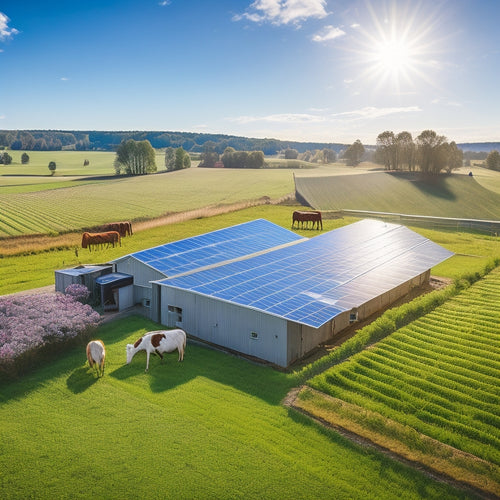
Ground Mounted Solar Panels Vs Traditional Fossil Fuels
Share
Ground-mounted solar panels provide a cost-effective, eco-friendly alternative to traditional fossil fuels. Over the long term, you could save between $400 and $1,000 annually on energy costs. Solar panels reduce your carbon footprint considerably, potentially lowering emissions by up to 80%. While the initial investment is higher, financing options and tax incentives help offset these costs. Maintenance for solar systems is minimal compared to the rising expenses of fossil fuels. Additionally, solar energy promotes energy independence and stability in energy bills. To investigate further advantages and considerations in your energy shift, keep delving into the topic.
At a Glance
- Ground-mounted solar panels require a higher initial investment but offer long-term savings of $400-$1,000 annually on energy costs.
- Solar energy systems have minimal maintenance costs, averaging $20-$30 per kilowatt yearly, compared to over $100 for fossil fuels.
- Solar panels significantly reduce carbon emissions, offering up to an 80% reduction compared to traditional fossil fuels.
- Solar energy production is renewable and helps promote energy independence, while fossil fuels contribute to pollution and climate change.
- Government incentives and technological advancements make solar energy more accessible and financially attractive in the long run.
Lower Long-Term Energy Costs
When comparing initial investments, ground-mounted solar panels often require a higher upfront cost than traditional fossil fuels.
However, over time, the lower maintenance costs and decreasing price of solar technology can lead to significant long-term savings.
Additionally, solar panels can reduce energy costs by 50-75%, saving $400-$1,000 annually, making them an attractive option for homeowners.
Analyzing these factors reveals a persuasive case for solar energy as a more cost-effective option in the long run, especially when considering financial incentives that can lower upfront installation costs.
Initial Investment Comparison
Investing in ground-mounted solar panels often presents a lower long-term energy cost compared to traditional fossil fuels. While initial installation costs can be significant, financing options like loans and leases can ease upfront expenses. Additionally, tax incentives often offset these costs, making solar an attractive choice for many homeowners.
The equipment lifespan of solar panels typically exceeds 25 years, allowing you to benefit from energy independence and stable utility rates over time. In contrast, fossil fuel prices are subject to market trends and regional factors, leading to unpredictable long-term expenses.
Governmental policies also play an essential role. Many regions have enacted supportive legislation, which can further reduce your investment burden. Technological advancements in solar energy have driven down costs, making it increasingly accessible.
When analyzing the initial investment, consider not just the upfront costs but also the long-term savings and benefits that solar energy can provide. In a world where energy freedom is paramount, shifting to solar could be your path to reduced energy expenses and enhanced sustainability.
Therefore, while the initial investment may vary, the long-term returns often favor ground-mounted solar panels.
Maintenance Cost Analysis
Evaluating maintenance costs reveals a significant advantage for ground-mounted solar panels over traditional fossil fuel systems. When you consider solar panel upkeep, the costs are significantly lower. Typical solar panels require minimal maintenance, mostly involving periodic cleaning and occasional inspections, which can be done at a fraction of the cost of fossil fuel maintenance.
In contrast, fossil fuel systems often incur substantial ongoing expenses, including regular equipment servicing, fuel purchases, and environmental compliance costs.
Data shows that the average annual maintenance cost for solar panels is around $20 to $30 per kilowatt, whereas fossil fuel systems can rack up costs exceeding $100 per kilowatt annually. This stark difference highlights how ground-mounted solar panels not only simplify upkeep but also contribute to lower long-term energy costs.
Moreover, as fossil fuel resources dwindle, maintenance costs for those systems are likely to rise, further widening the gap. By investing in solar technology, you're choosing a more sustainable and economically viable energy source that aligns with your desire for freedom from fluctuating fuel prices and costly repairs.
In the long run, solar panels prove to be a wise financial decision.
Environmental Sustainability Advantages
When you compare ground mounted solar panels to traditional fossil fuels, the environmental sustainability advantages become clear.
Solar energy considerably reduces carbon emissions, contributing to a healthier atmosphere. In fact, one watt of solar power can save up to 300 pounds of CO2 emissions annually, making it a powerful tool for long-term ecological stability.
Furthermore, as a renewable energy source, solar power provides a sustainable alternative that can support long-term ecological stability.
Reduced Carbon Emissions
As society increasingly prioritizes environmental sustainability, the stark contrast in carbon emissions between ground-mounted solar panels and traditional fossil fuels becomes apparent.
Ground-mounted solar panels produce minimal carbon emissions during operation, greatly reducing your overall carbon footprint. In contrast, fossil fuels release substantial greenhouse gases, contributing to climate change and environmental degradation.
Data indicates that shifting to solar energy can lead to an emission reduction of up to 80% compared to conventional energy sources.
When you choose solar, you're actively participating in a cleaner energy future, one that mitigates the detrimental effects of fossil fuel consumption.
The International Energy Agency reports that renewable energy sources, including solar, could prevent the release of billions of tons of carbon dioxide annually if adopted widely.
Renewable Energy Source
The advantages of ground-mounted solar panels extend beyond just reducing carbon emissions; they represent a significant shift towards renewable energy sources that promote environmental sustainability. By utilizing solar energy, you not only contribute to a cleaner planet but also align with current solar energy trends and renewable technology advancements.
Here's a comparison of traditional fossil fuels versus ground-mounted solar panels:
| Aspect | Ground-Mounted Solar Panels | Traditional Fossil Fuels |
|---|---|---|
| Carbon Footprint | Minimal | High |
| Renewable Potential | Unlimited | Finite |
| Maintenance Costs | Low | High |
Investing in solar technology helps decrease reliance on finite resources, ensuring energy security and independence. The advancements in renewable technologies make solar panels more efficient and affordable, creating a sustainable energy future. As you adopt ground-mounted solar panels, you're not just opting for a power source; you're advocating for a more resilient environment. Each solar panel installed is a step toward freedom from pollution and resource depletion, enabling you to make a positive impact on the earth.
Key Advantages of Solar
When considering solar energy, you'll find significant advantages in both environmental impact reduction and long-term cost savings. By utilizing solar panels, you can decrease greenhouse gas emissions while also benefiting from lower energy bills over time.
This dual advantage not only supports sustainability but also enhances your financial stability in the long run. Furthermore, the shift to solar energy contributes to a lower carbon footprint and promotes energy independence, allowing homeowners to enjoy greater control over their energy consumption choices, thereby maximizing their savings and comfort.
This proactive approach to combat climate change not only benefits individual homeowners but also contributes to a healthier planet for future generations.
Environmental Impact Reduction
Switching to ground-mounted solar panels greatly reduces environmental impacts compared to traditional fossil fuels. By capturing solar energy, you directly contribute to biodiversity preservation. Unlike fossil fuel extraction, which disrupts habitats, solar installations can be designed to coexist with local wildlife, promoting habitat restoration.
Moreover, solar power systems employ land that can often be managed in ways that enhance soil health. The reduced need for chemical fertilizers and pesticides leads to less soil degradation. This encourages a thriving ecosystem balance, nurturing a healthier environment.
Water conservation is another critical aspect. Traditional fossil fuel extraction methods consume significant water resources, often leading to contamination and depletion. In contrast, solar energy production requires minimal water, allowing for better management of this precious resource, especially in arid regions.
Long-Term Cost Savings
Investing in ground-mounted solar panels offers substantial long-term cost savings that can greatly impact your financial outlook.
With rising energy costs, switching to solar can provide predictable energy bills, allowing for effective financial forecasting. Over time, you'll likely notice a significant reduction in monthly utility expenses, translating to thousands saved.
The investment payback period for solar panels typically ranges from 5 to 10 years, depending on various factors such as location, installation costs, and available incentives.
Once you've recouped your initial investment, you can enjoy years of free energy, which enhances your financial independence.
Moreover, solar energy systems often increase property value, making them a wise investment.
As fossil fuel prices continue to fluctuate, relying on solar energy shields you from price volatility, ensuring a stable financial future.
Selecting Based on Energy Goals
When selecting between ground-mounted solar panels and traditional fossil fuels, you should consider energy efficiency and long-term costs.
Analyzing the energy output and operational expenses of both options can reveal significant differences in sustainability. By opting for solar energy, you not only reduce your carbon footprint but also potentially save thousands annually on energy bills, which aligns with lower energy bills guarantee.
Energy Efficiency Comparison
Choosing between ground-mounted solar panels and traditional fossil fuels hinges on understanding their energy efficiency in relation to your specific energy goals. When evaluating energy conversion, it's vital to look at the efficiency metrics of each option.
Solar panels generally convert sunlight into usable energy at rates ranging from 15% to 22%, depending on technology and conditions. In contrast, fossil fuels like coal or natural gas can achieve efficiency metrics of around 33% to 45% in power generation, considering waste heat recovery.
However, these figures don't tell the whole story. Solar energy is renewable and produces no direct emissions, making it a cleaner long-term choice for those focused on environmental impact.
Fossil fuels, while efficient in energy conversion, contribute to pollution and climate change, which might contradict your energy goals for sustainability.
Ultimately, your decision should reflect your values regarding energy independence and environmental stewardship. If maximizing energy conversion is your sole focus, fossil fuels may seem appealing.
Yet, if you prioritize sustainability and reducing your carbon footprint, ground-mounted solar panels could align more closely with your energy vision.
Long-Term Cost Analysis
Long-term cost analysis reveals significant differences between ground-mounted solar panels and traditional fossil fuels, impacting your energy goals.
When you evaluate these two options, consider not just initial investments but also ongoing expenses. Ground-mounted solar panels typically require higher upfront costs, but financing options like solar loans or leases can mitigate this. Over time, the savings on electricity bills can offset these initial expenses, leading to a favorable return on investment.
In contrast, fossil fuels often come with fluctuating prices influenced by market volatility and geopolitical factors. This unpredictability can translate into higher long-term costs.
Additionally, various energy incentives at federal, state, and local levels can further reduce the effective cost of solar installations. These incentives, such as tax credits or rebates, enhance the financial viability of solar energy, making it a more stable choice.
Ultimately, aligning your energy goals with a thorough understanding of these long-term costs will enable you to make informed decisions.
Renewable Energy Source Availability
When considering solar energy, you should evaluate its consistency across different regions and seasons.
Data shows that areas with high sun exposure can generate substantial energy, while cloud cover and shorter days can impact output.
Understanding these patterns helps you assess whether solar is a reliable option for your energy needs.
Solar Energy Consistency
Solar energy consistency is a critical factor in evaluating its viability as a renewable energy source compared to traditional fossil fuels. While fossil fuels provide steady energy outputs, solar reliability can vary considerably due to natural phenomena.
Energy fluctuations arise from factors like cloud cover, seasonal changes, and geographical location, which can affect how much sunlight your solar panels receive. Data shows that solar energy production can be less predictable than fossil fuel generation, which typically operates at a consistent capacity.
For instance, solar energy systems might generate up to 80% of their potential output during peak sunlight hours but could drop to nearly zero at night or during overcast days. This inconsistency can pose challenges for energy storage and grid management, requiring investments in battery technologies or hybrid systems to guarantee a constant energy supply.
However, advancements in solar technology and forecasting methods are improving the predictability of solar energy outputs. By incorporating energy storage solutions and smart grid technologies, you can mitigate some of the impacts of energy fluctuations, creating a more reliable system overall.
Ultimately, balancing these factors will be key to maximizing solar energy's potential in a sustainable future.
Frequently Asked Questions
How Do Ground-Mounted Solar Panels Affect Property Value?
Ground-mounted solar panels can enhance your property value by improving energy efficiency. Studies show homes with solar installations often sell for more, as buyers appreciate reduced energy costs and sustainable living options in today's market.
What Are the Maintenance Requirements for Ground-Mounted Solar Panels?
You'll feel like a superhero with ground-mounted solar panels! They require minimal maintenance, needing cleaning a few times a year and regular system monitoring to guarantee peak performance. Accept your freedom with effortless upkeep!
Can Solar Panels Operate During Winter or Cloudy Days?
Yes, solar panels can operate during winter or cloudy days, although their solar efficiency decreases. Advanced technology improves winter performance, ensuring you still capture energy, even when sunlight isn't as strong. It's a reliable, sustainable choice.
What Incentives Exist for Switching to Solar Energy?
When you switch to solar energy, you can benefit from various incentives, including tax credits and rebates. These financial advantages promote renewable energy adoption, helping you reduce costs while contributing to a sustainable future.
How Long Do Solar Panel Installations Typically Last?
Imagine a sturdy oak tree, standing strong for decades. Similarly, solar panel installations typically last 25-30 years, showcasing impressive durability. Their lifespan guarantees reliable energy production, aligning with your desire for long-term freedom and sustainability.
Explore More
In the battle between ground-mounted solar panels and traditional fossil fuels, it's clear that solar shines brighter. Not only do you benefit from lower long-term energy costs, but you also contribute to a cleaner planet. Imagine a future where your energy source doesn't choke the air but nurtures it instead. By selecting solar, you're not just making a choice for today; you're investing in a sustainable tomorrow. The data speaks volumes: renewable energy is the path forward.
Related Posts
-

What Do I Need to Know About Farm Solar Panels
When considering farm solar panels, you need to assess costs, benefits, and technical specifics. Initial investment c...
-

Solar Phone Chargers for Camping Essentials
Solar phone chargers are must-haves for your camping essentials, allowing you to stay connected while enjoying nature...
-

Top Off Grid Solar Batteries for Renewable Energy
When seeking top off-grid solar batteries for renewable energy, consider options with advanced battery chemistry, suc...


